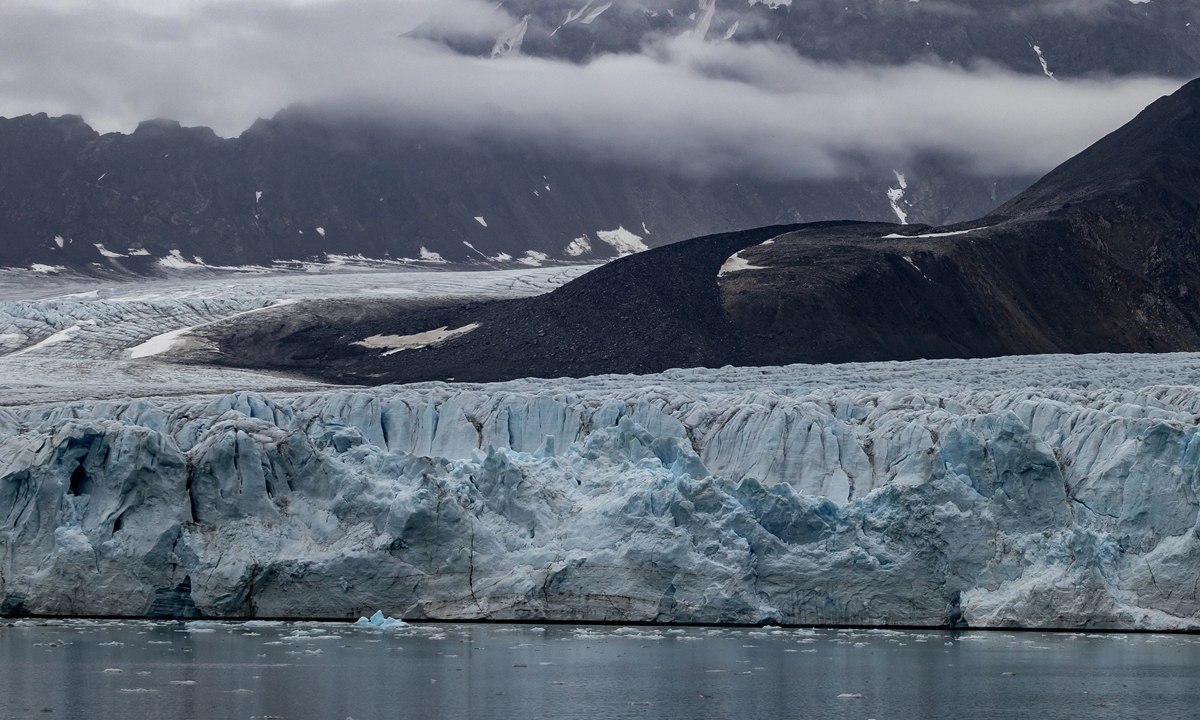
A view of fiords as they melt due to climate change near Svalbard Islands, in the Arctic Ocean in Norway on July 19, 2022.Photo:VCG
Climate warming in the have accelerated over the past 40 years, with the overall warming rate 3.7 times that of the world over the same period, according to the Annual Report on Polar Climate Change 2022 released by the China Meteorological Administration on Thursday.
Polar Regions, the extensive icy regions around the North and South Poles, is a sensitive area and amplifier of global ecological change, and the changes in its climate and atmospheric environment will have an impact on the weather and climate of the globe and the sustainable development of the economy.
The Arctic has accelerated its warming over the past 40 years, with the overall warming rate reaching 0.63 C /10 years during 1979-2022, 3.7 times the global warming rate of 0.17 C /10 years during the same period, according to the report.
In 2022, the average temperature in the Arctic was 1.10 C higher than usual. Antarctic temperatures have not changed much compared to the climate average, but this does not mean that climate change in the Antarctic region can be ignored. In fact, the Antarctic Peninsula is still warming at a rate far faster than the global average.
Since the late 1970s, Antarctic sea ice extent has experienced a long-term slow growth and began to decrease rapidly in 2014. Data from Fengyun-3 polar-orbit meteorological satellites show that the monthly average of Antarctic sea ice extent in February and September 2022 is 23.84 percent and 2.96 percent smaller than the annual average, among which the summer sea ice extent reached a record low.
From 1984 to 2021, the atmospheric concentration of greenhouse gases in the Arctic and Antarctic regions showed a steady upward trend, which is basically consistent with the global trend.
Finally, the report also pointed out that the total amount of ozone in the North and South Poles show differential changes, the Antarctic ozone hole area in 2022 is slightly smaller than the year of 2021, the overall continuation of the shrinking trend in recent years and the area of ozone ranked 12th in history since 1979. In the Arctic, the average Arctic ozone total from the end of December 2022 to March 2023 was unusually high compared to historical levels.
UN Secretary General António Guterres warned on July 27 that as the world has been suffering a month of heat with record high temperatures that the "era of global boiling has arrived." Scientists and weather agencies around the world confirmed that July is on track to be the world's hottest month on record on Earth in 120,000 years
Meanwhile, China is battling with concurrent climate disasters with both sizzling temperatures and flooding gripping northern parts of the country, while the south is managing the cleanup from typhoon Doksuri while at the same time preparing for Khanun, which has already affected more than 724,600 people.
As extreme weather takes its toll globally, Chinese experts called on certain countries to set aside their political agenda and take drastic action on international cooperation to curb global warming.
Global Times




